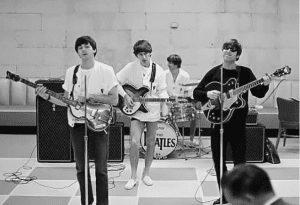Why John Lennon Once Accused Rod Stewart of Ripping Off The Beatles

via Beatles Bible / YouTube
Accusations of musical plagiarism are not uncommon in the world of rock and pop. With so many artists borrowing inspiration from one another, it becomes difficult to draw a firm line between influence and imitation. In some cases, even iconic figures like Rod Stewart have been at the center of such discussions.
Rod Stewart, despite his success and originality, has faced scrutiny over certain tracks that closely resemble existing songs. His hit singles “Do You Think I’m Sexy” and “Forever Young” are two examples that stirred legal and creative controversy. Stewart himself admitted to “unconscious plagiarism” in his memoir, further highlighting how blurred the lines can be.
But among the more curious accusations came from none other than John Lennon. The former Beatle once suggested that Stewart’s 1976 single “The Killing of Georgie” bore striking resemblance to The Beatles’ “Don’t Let Me Down.” It wasn’t a lawsuit or a formal complaint—but a public jab from one legend to another.
View this post on Instagram
Lennon’s Last Interview and His Candid Take
In 1980, during what would become one of his final in-depth interviews, John Lennon sat down with journalist David Sheff for All We Are Saying. The conversation covered much of his life and music, with Lennon offering reflective commentary on his Beatles catalog. One moment, however, stood out for its sharpness.
While discussing “Don’t Let Me Down,” Lennon made an offhand remark about Rod Stewart. “By the way, Rod Stewart turned that into ‘[Georgie] don’t go-o-o,’” he noted, pointing out the melodic similarity between the two songs. He questioned why Stewart didn’t just cover the original instead of reworking it—implying the motive was financial.
Though Lennon didn’t pursue the issue beyond this interview, the comment was a clear indication that he felt Stewart had crossed a line. For Lennon, originality wasn’t just about sound—it was about integrity. His statement came off more as a criticism of the music industry’s practice than a personal feud.
Rod Stewart’s Track Record with “Borrowing”
This wasn’t the first time Rod Stewart faced questions about the originality of his work. Earlier, Brazilian musician Jorge Ben Jor sued him for similarities between “Do You Think I’m Sexy” and his own song “Taj Mahal.” Stewart eventually acknowledged the likeness and settled the matter by attributing it to unconscious imitation.
Likewise, his track “Forever Young” drew immediate comparisons to Bob Dylan’s 1974 song of the same name. Rather than deny the connection, Stewart agreed to share royalties and officially credited Dylan. It was a rare example of how artists can resolve such overlaps amicably, without escalating tensions.
So when Stewart was asked in 2016 about the similarity between “The Killing of Georgie” and “Don’t Let Me Down,” his response was casual: “It does sound like it… Nothing wrong with a good steal!” That remark may have been flippant, but it added fuel to Lennon’s decades-old comment—suggesting Stewart was well aware of the resemblance all along.
View this post on Instagram
When Influence Becomes Interpretation
While some see these moments as clear-cut cases of plagiarism, others view them as examples of how music evolves by building on what came before. In truth, the boundaries between homage, influence, and imitation are often difficult to define. Even legends sometimes echo one another without intending harm.
In Stewart’s case, his career remains largely unmarred by these accusations. Fans continue to embrace his music, including the controversial tracks, as part of his unique legacy. The occasional overlap with other artists, intentional or not, hasn’t slowed his momentum or diminished his impact.
As for Lennon, his comment lives on as a reminder of how protective some artists are over their creations. It wasn’t about rivalry, but rather respect—for originality, for the craft, and for the value of a single, unforgettable melody. In the end, maybe it was just one artist calling out another for getting a little too close to something sacred.













